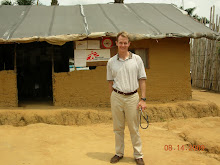23 August 2009
As you have probably guessed, there are a great deal of differences between medical care here in Congo and the US. At first glance, it's the technology differences that strike you, but then you start to think, which is becoming increasingly difficult to do.
In Lubutu, we don't have much in the way of laboratory testing. We can get a blood count, blood smear for parasites, and dipstick for urinalysis. There is no microbiology here, which is striking. In this place full of weird bacteria and invasive parasites, there is no way to culture blood or urine or spinal fluid to definitively diagnose an infecting organism. As we can't culture anything, we can't test the sensitivity of bacteria against different antibiotics. Instead, we use protocols.
If someone has pneumonia, they get an antibiotic that kills the most common organisms causing pneumonia in Congo. If they get better, great. If not, the protocol says to give 10 days of a different antibiotic. If that doesn't work we are to search for tuberculosis using chest x ray and a sputum smear. But if we get to this point and they don't have TB, there is nowhere to go, diagnostically or therapeutically. There is no way to culture the sputum to try to figure out if your patient has something treatable (and you've just been giving the wrong antibiotic) or untreatable. Without technology, the protocol stops. There are no further suggested diagnostic tests or treatment. The patient just keeps coughing.
This came to mind last week at Mungele. A 30 year old man came in two weeks ago with a bad middle ear infection. Per the protocol, we gave him amoxicillin. When he didn't get any better, we began daily injections of different antibiotic to try to clear the pus behind his eardrum. It didn't work. So what next? Unfortunately, nothing. In the US, I would have stuck a needle into the pus, sucked it out, and sent it off to the microbiology lab. The lab would culture it and send me a report identifying the organism. That report would also tell me which antibiotic to use to cure my patient. But here I had to tell this man that unfortunately I had done all I could for him. That's difficult when you know that if this person were in the US, you could easily help him.
Another big difference between medical systems is the lack of focus on chronic disease in the developing world. In the US, as a pediatric neurologist, I deal with chronic disease daily. Half of my patients have epilepsy, a condition that persists for years. Here chronic disease is often not treated.
Last week I saw an adolescent with muscular dystrophy. He was in the hospital for pneumonia, which was being treated. The hospital medical staff asked me to talk to the patient and his family about prognosis and the genetics of the condition. So we had a long chat in Swahili and French. But then I thought….why isn't this poor boy getting physical therapy and chest percussion, to keep him mobile and free of illness as long as possible?
Most cases like this don't affect me (except emotionally) on a daily basis. Working in the Centres de Santé I am in the front line of primary care. People usually come to see us when they are acutely ill. Still there are issues that come up, like the chronic aches and pains we aren't treating.
People here do a lot of hard physical labor. If they have a heavy load, it is carried on the back. A strap is tied around the load and this is looped around the forehead. So guess what at least half the population lists as one of their medical complaints? Yep- headache and back pain. In the West, similar complaints get oral pain relievers, local therapies (heat or cold), massage, or even physical therapy. Here we tell people they need to rest. I'm fine with that, but when they come back after a couple of weeks rest and their knees are still stiff and achy, then what? Well then…..nothing. We don't hand out a month's supply of ibuprofen or give them physical therapy. We shrug our shoulders and say we're sorry and that there's nothing we can do.
Or perhaps in this place where most people die of malaria, pneumonia, or diarrhea, treatment of chronic conditions is a luxury that few people can access or afford. I hear health care spoken of as a basic human right, but is it only health care for acute conditions that it is basic human right, or all conditions?
Friday, August 28, 2009
Subscribe to:
Post Comments (Atom)

Your post today really brings home the hardships endured there. I'm deeply touched by your caring, and can't imagine the stress of knowing you cannot help as much as you might be able to, back here in the States.
ReplyDeleteWe're really impressed by what you are doing, Doug.
ReplyDeleteA few questions.... what is the average daily temperature? Is it very humid? Does it rain daily? Are you personally at risk from diseases such as malaria?
Margaret and David